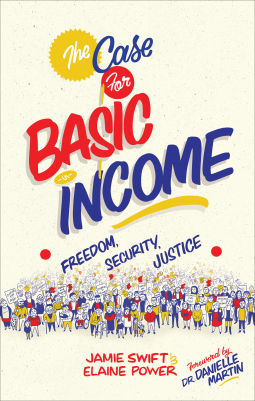
The Case for Basic Income
Freedom, Security, Justice
by Jamie Swift and Elaine Power
This title was previously available on NetGalley and is now archived.
Send NetGalley books directly to your Kindle or Kindle app
1
To read on a Kindle or Kindle app, please add kindle@netgalley.com as an approved email address to receive files in your Amazon account. Click here for step-by-step instructions.
2
Also find your Kindle email address within your Amazon account, and enter it here.
Pub Date May 03 2021 | Archive Date May 03 2021
Talking about this book? Use #TheCaseforBasicIncome #NetGalley. More hashtag tips!
Description
Inequality is up. Decent work is down. Free market fundamentalism has been exposed as a tragic failure. In a job market upended by COVID-19—with Canadians caught in the grip of precarious labour, stagnant wages, a climate crisis, and the steady creep of automation—an ever-louder chorus of voices calls for a liveable and obligation-free basic income.
Could a basic income guarantee be the way forward to democratize security and intervene where the market economy and social programs fail? Jamie Swift and Elaine Power scrutinize the politics and the potential behind a radical proposal in a post-pandemic world: that wealth should be built by a society, not individuals. And that we all have an unconditional right to a fair share.
In these pages, Swift and Power bring to the forefront the deeply personal stories of Canadians who participated in the 2017–2019 Ontario Basic Income Pilot; examine the essential literature and history behind the movement; and answer basic income’s critics from both the right and left.
Advance Praise
“There is no economic or moral justification for the poverty afflicting millions of people in Canada—one of the richest places on Earth. In this timely, passionate, and convincing book, Jamie Swift and Elaine Power invoke the powerful vision of basic income to inspire a fundamental rethinking of poverty and how to fight it.”
– Jim Stanford, Economist and Director, Centre for Future Work
"This book should be required reading for every current and aspiring politician. Swift and Power brilliantly demonstrate the incredible and transformative potential of guaranteeing a basic liveable income in respecting fundamental human rights, like our right to food."
– Paul Taylor, Executive Director, Foodshare Toronto
Available Editions
| EDITION | Paperback |
| ISBN | 9781771135474 |
| PRICE | CA$24.95 (CAD) |
Average rating from 5 members
Featured Reviews
The early part of the twentieth century birthed an extraordinary concept, where the ethics of work was deemed synonymous with the concepts of diligence, discipline and frugality. Termed the Protestant work ethic, this philosophy was first purveyed by the German sociologist, Max Weber. Also known as the Calvinist or Puritan work ethic, this thinking laid the steppingstone for the birth of capitalism. Unwittingly, the Protestant work ethic also resulted in a “sacralization” of work. Irrespective of the quality, indignity, brutality, or even futility of the nature of the job, the employee or worker was supposed to bear the same as a badge of honour. This entrenched dogma has led to a sustained and consistent opposition to schemes such as Universal Basic Income (“UBI”) or Guaranteed Basic Income. Politicians as well as taxpayers, irrespective of the ideologies they espouse seem to stand on a harmonized footing in their deplorably common belief that any scheme involving an unconditional payment of money would in the larger scheme of things, turn out to be a deleterious “largesse” encouraging sloth and vice. Award winning Canadian journalist Jamie Swift and Head of Department of Gender Studies in University of Toronto, Elaine Power, set out in gut wrenching detail the timely conception and untimely evisceration of a Universal Basic Income Pilot (“UBIP”) Project in Toronto.
Indefatigable efforts expended by the likes of Hugh Segal, former Senator, political strategist and a vociferous proponent of Basic Income, and health economist at the University of Manitoba, Evelyn Forget, whose meticulous revealing of 1,800 boxes of raw data from a similar Basic Income Project in Mincome in the 1970s lent further credence to the concept, resulted in the region of Lindsay being selected as the ‘saturation’ for the institution of a Universal Basic Income Pilot (“UBIP”). Supposed to be for a duration of three years, the Project was flagged off by former Liberal Premier Kathleen Wynne in late 2017. However, in spite of its tremendous success (as attested to by the beneficiaries of the scheme) the UBIP was brought to a grinding halt by the newly elected Premier Doug Ford, a Member of the Progressive Conservative Party. Ford, within days of terminating the scheme announced with great pomp and splendour his intention to reduce the cost of beer to just one buck. Talking about priorities!
As Swift and Power beautifully illustrate, the COVID-19 pandemic that is wreaking wanton havoc across the globe has brought to light a new set of unsung heroes in the form of essential workers, and health care providers. But while the world was temporarily honouring these ‘heroes’ a precarious socio-economic situation still ensured that these people were forced to put their lives in danger by taking the public transport on a daily basis and ensuring that there was no interruption in their services to the general public. However, with some of these essential workers taking on multiple roles especially as caregivers in old age homes, the risks to both the caring and the cared takes on ominous proportions. The Canadian Institute for Health Information reported that some ten thousand long-term care workers were infected. The COVID-19 pandemic exacerbated the need for ushering in safety and security for the economically underprivileged and racialized segments of the society. The Canadian Government, responding to this clamour introduced the Canada Emergency Response Benefit (“CERB’). A whopping eight million Canadians applied for benefits under CERB. However as the authors illustrate an incorrigible linking of paid employment with CERB ensured that close to 1.4 million Canadians did not qualify for CERB. Again the sacralization of work had reared its ugly head.
With two Canadian billionaires Galen Weston and David Thomson enjoying the same proportion of wealth as is the prerogative of the poorest 30 percent of Canada, establishing exclusion criteria for a UBI only goes on to accentuate the perils of inequality. As the authors illustrate, Canada has always been a fertile ground for propagating the benefits of Basic Income. The Basic Income Canada Network (“BICN”) in fact as the authors write, “published the first-ever detailed set of policy options for a Canadian Basic Income, identified as an unconditional cash transfer from the state to individual people.” In a landmark report issued as long back as in 1971, the Special Senate Committee on Poverty headed by Senator David Croll, recommended a national Basic Income Plan to be income-tested and funded by the federal government. There was also the Mincome Project established in Winnipeg and Ottawa in 1974, with predominant funding provided by the federal government. The Canadian Council on Social Development (“CCSD”), supported a guaranteed annual income initiative christened as “CORE”, in the 1980s. CORE, critically strived to accord recognition and importance to what Swift and Power term to be an “amorphous” category of “community Development”, along with “voluntary work, education and training, and child rearing.” Thus an auspicious beginning was made towards an attempt at “desacralization” and redefinition of work.
Riding on the back of such illustrious and formidable social initiatives, the UBIP was kicked off with great fanfare, when in April 2007, Premiere Wynn stood before four thousand people from Hamilton-Brantford, Lindsay, and Thunder Bay to inaugurate the Pilot. The proposal was for every beneficiary to receive $17,000 per year. The programme was a resounding success as it enabled many people otherwise dependent on food banks and disability benefits to hope for a life of dignity, self esteem and good health. Single mothers such as Jodi Dean, whose daughter Madi Dean was suffering from an incurably debilitating disorder such as osteogenesis imperfecta, and patients such as Lance Dingman who, a fall and eighteen surgeries later still chose to lead a life of independence and courage, were immensely benefitted by the UBIP as were multiple other small business owners and labourers.
Yet Doug Ford and his party decided to pull the plug on a perfectly well functioning UBIP, just 8 months into its introduction. This was a scheme that taken an immense load of stress off its beneficiaries and lent them a degree of status and confidence. Behavioural psychologist Eldar Shafir and behavioural economist, Sendhil Mullainathan, “showed that reducing stress about money allowed people to think more clearly.” Ford and his party were egged on in their indiscreet action by the likes of the vitriolic Brian Lilley. A columnist for the Sun, Lilley terms the UBI “stupid” and rails against it at every given opportunity. This is in stark contrast to the views of long standing and rabid UBI advocates such as Guy Standing, Philippe Van Parjis and Yannick Vanderborght, who are steadfast in their opinion that building a Basic Income floor simply “helps equalize what people are given and more roughly “what they might achieve with what they are given”.
In his Nicomachean Ethics, Aristotle holds forth on the virtues of a contemplative life and articulates how happiness can be established through virtue. Perhaps it is time to bring this simple yet profound philosophy to bear. It is time to undertake a brave and timely “desacralization” of work. A delinking that would ensure that in times of rampant robotization and automation, displaced workers can still find their footing. To quote Daniel Susskind in his seminal work, “A World Without Work”, “economists had thought that to accomplish a task, a computer had to follow explicit rules articulated by a human being — that machine capabilities had to begin with two-down application of human intelligence.” But machines are “now deriving entirely new rules, unrelated to those that human beings follow. This is not a semantic quibble, but a serious shift. Machines are no longer riding on the coattails of human intelligence.”
A UBI is not just to ensure that a harassed worker escapes a bad boss and still manages to lead a life of basic sufficiency and adequacy, although this in itself is good enough a reason. A UBI however goes beyond this. It attempts to bestow facilitate an aspiring yet economically debilitated individual to find genuine purpose in life. With this book, Jamie Swift and Elaine Power do much more than just add credibility to this proposition.
(The Case for Basic Income: Freedom, Security, Justice by Jamie Swift and Elaine Power is published by Between The Lines and will be released on the 3rd of May 2021)
 Reviewer 800807
Reviewer 800807
Basic Income is not a new topic but I was curious to see how this concept was discussed, especially given the inequities during the pandemic. While many white collar workers were able to pivot, minimize interactions to reduce exposure, and adapt to a work-from-home lifestyle, many essential workers were hourly-wage employees that did not have this same luxury. This book described the concept of basic income and its implications on lifting individuals out of poverty. Although I am familiar with the concept, including examples of how the pandemic has further pointed to a need to have better social programs and employment insurance.
The discussion of basic income was set against the backdrop of the Ontario Basic Income Program and how this promising program ended before it was scheduled to sunset. While there are lot of observational points and real-life examples, the piece that was missing for me was a more pointed conclusion and data. I wanted the author to tell spell it out more assertively that this program cost X amount of dollars, lifted incomes by Y, and if it had been in place prior to the pandemic then Z would have/have not happened. To some extent, the argument is there, but perhaps not as authoritative and assertive as I would have liked. I am hoping that the author will revisit this as more data on the impact of the pandemic becomes available.
Readers who liked this book also liked:
Silvia Moreno-Garcia
Historical Fiction, Literary Fiction, Sci Fi & Fantasy
We Are Bookish
General Fiction (Adult), Romance, Women's Fiction
L.M Montgomery
Children's Fiction, Comics, Graphic Novels, Manga, Teens & YA














